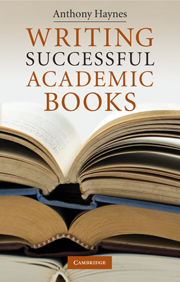Book contents
- Frontmatter
- Contents
- List of figures
- List of tables
- List of boxes
- Foreword by Jaan Mikk
- Preface
- PART I BECOMING AN AUTHOR
- 1 Foundations
- 2 Contexts
- 3 Getting commissioned
- 4 Contracts and agents
- PART II WRITING THE TEXT
- PART III MANAGING THE PROJECT
- Appendix A Proposal guidelines
- Appendix B Sample book proposal
- Appendix C Guide to contracts
- Notes
- References
- Index
- Frontmatter
- Contents
- List of figures
- List of tables
- List of boxes
- Foreword by Jaan Mikk
- Preface
- PART I BECOMING AN AUTHOR
- 1 Foundations
- 2 Contexts
- 3 Getting commissioned
- 4 Contracts and agents
- PART II WRITING THE TEXT
- PART III MANAGING THE PROJECT
- Appendix A Proposal guidelines
- Appendix B Sample book proposal
- Appendix C Guide to contracts
- Notes
- References
- Index
Summary
If you are reading this page, the likelihood is either that you have decided to write an academic book or that you are contemplating doing so. The decision to write a book entails a number of questions. For example: Why write? What to write? For whom? And what does one want to achieve? These are the questions this chapter is designed to answer.
WHY WRITE?
Writing a book is a serious commitment, one that is likely to require several hundred hours of your time. It is worth examining, therefore, the reasons for making that commitment. There is, after all, no shortage of other things one can do with one's time.
I suspect that many academic authors don't give much thought to the question, ‘Why write?’ The phrase ‘publish or perish’ is well established in academia and it is tempting to treat it as a sufficient answer to our question. Yet it's worth going behind this phrase and considering the question of authorial motivation in more detail. Aims vary greatly between authors. The more conscious you are of your aims, the more you can use them to guide the decisions you make as an author – and the more likely you are to achieve those aims.
Let's consider some of the typical motivations. First, there is the wish to make money. This is a motivation that academic authors often play down.
- Type
- Chapter
- Information
- Writing Successful Academic Books , pp. 3 - 14Publisher: Cambridge University PressPrint publication year: 2010



